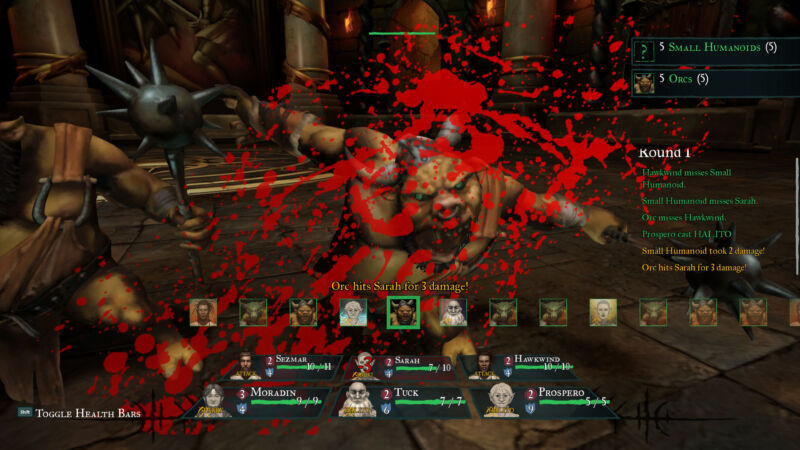On another level —
Digital Eclipse gives a new generation the best possible door to the dungeon.
Kevin Purdy
– Sep 15, 2023 5:40 pm UTC

Enlarge / Gotta say, this looks like a lot more than 3 points of damage.
Digital Eclipse
The original Wizardry, started by a Cornell University student in 1978 and released in 1981, was a mostly text-based affair, with just enough primitive Applesoft BASIC graphics to hint at what was happening. It was published by a newly formed Sir-Tech software, with just enough polish to stand out from the Ziploc-bagged crowd. And it was polished and play-tested enough to find its audience. It’s likely the first party-based RPG, and it all but created the genre “dungeon crawler.”
Wizardry: Proving Grounds of the Mad Overlord, as has been released in early access for PC today after two years of development, is a whole lot more than just “enough.” It’s adding fine-looking graphics, a whole bunch of quality-of-life improvements to navigating and managing your party, and quicker combat and spell selection. But it’s built on top of the same code as the original. “You can even view the original Apple II interface as you play,” developer Digital Eclipse says.
Here’s how combat looked in the Apple II version of Wizardry, and …
Digital Eclipse
… here’s how it looks in the remake, out today in early access.
Digital Eclipse
It looks like you’ll still need to resurface to resurrect your fallen characters, but dang if it doesn’t look nicer now.
Digital Eclipse
Digital Eclipse’s remake is based on the same code, and writing, as the original.
Digital Eclipse
There are more enhancements to come, too, as the game is under development—you can even read the team’s “Roadmap to October.” It costs $30 now on Steam and GOG, but will likely cost more at final release. Console versions look like they’ll follow after the final PC release, “before the end of 2024.”
Early access trailer for Wizardry: Proving Grounds of the Mad Overlord remaster.
It would not be proper to speculate too heavily on the quality of this remaster that’s still in early access. But we can do that a bit here, because this is Digital Eclipse, a company that went to ridiculous lengths to make the CRT scanning look right on the Mega Man Legacy Collection. It’s the firm that perfectly captured arcade nostalgia and balanced gameplay in the Street Fighter 30th Anniversary Collection. Digital Eclipse impressed us last year with not only a TMNT Cowabunga Collection but also Atari 50: The Anniversary Collection and a semi-kinda-new-vector game packed into it.
Digital Eclipse has repeatedly proven that it understands what fans like about a title, what could be improved without altering its feel, and how to present a game’s history, all in one reasonably priced bundle. This Wizardry remaster looks like nothing less than another well-considered release from these developers, one that should provide both an easy return trip for veterans and a smoother entry point for newcomers. I’ve logged zero hours in any Wizardry game, and I’m keen to see how it plays in 2023.
One thing is for certain: The game will not be easier to beat, just easier to play. The devs state that “the well-known difficulty of the enemies has not been altered.” In the original game, you couldn’t save your progress while you were still inside the dungeon, requiring you to crawl out first. I have to imagine that will be changed for this modern release, but you’ll still want to save up coins for resurrections—they look quite expensive.
Listing image by Digital Eclipse
>>> Read full article>>>
Copyright for syndicated content belongs to the linked Source : Ars Technica – https://arstechnica.com/?p=1968668










